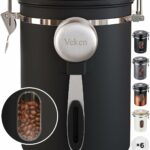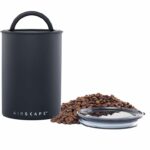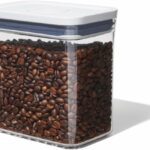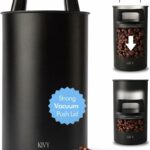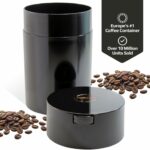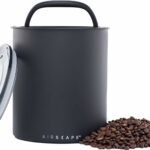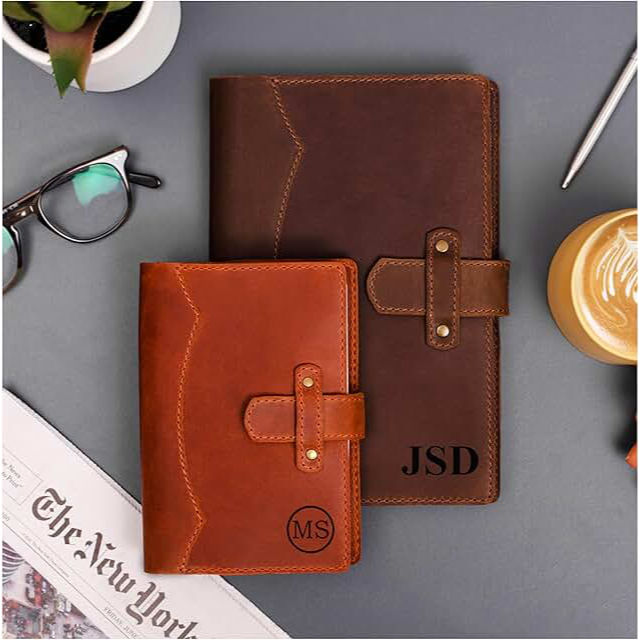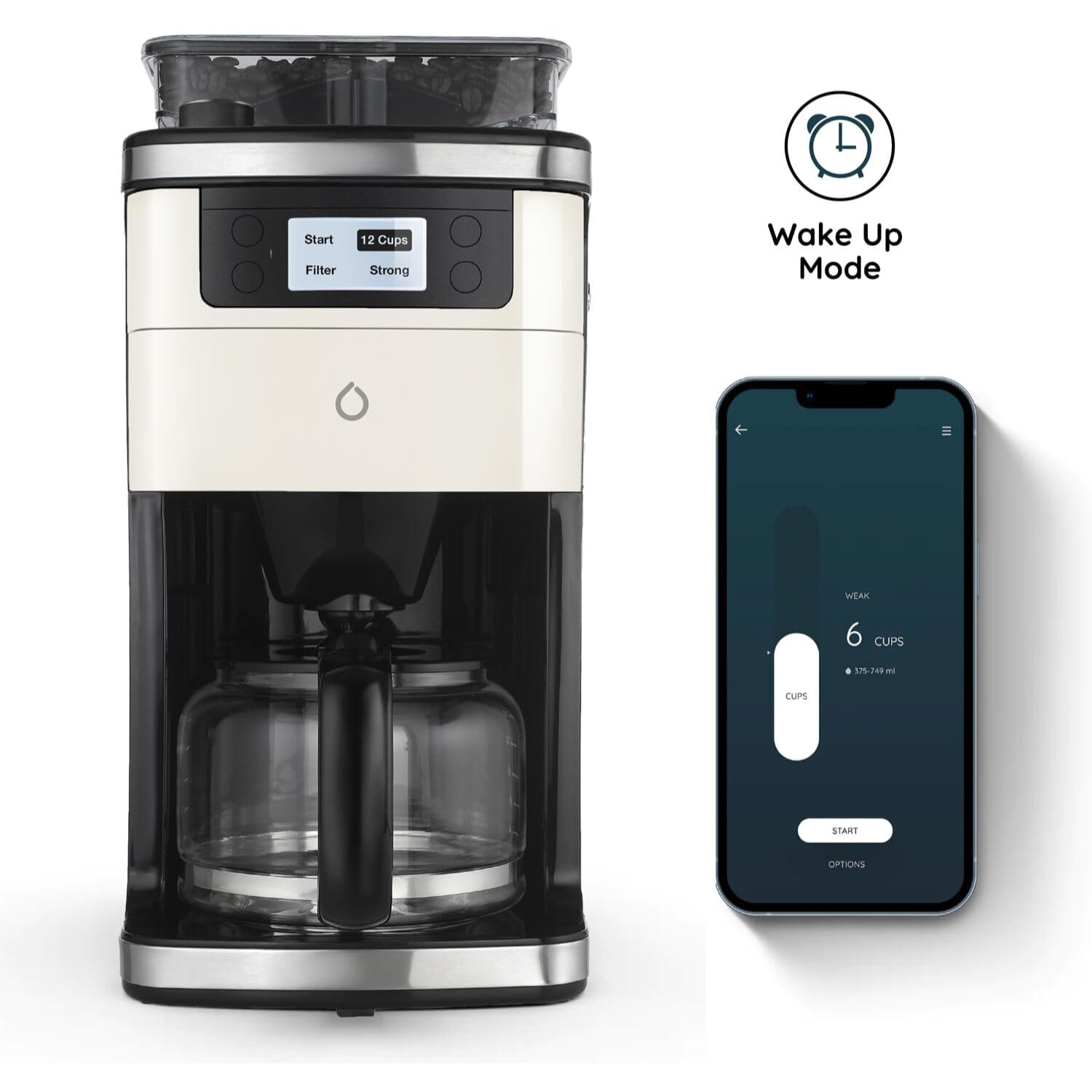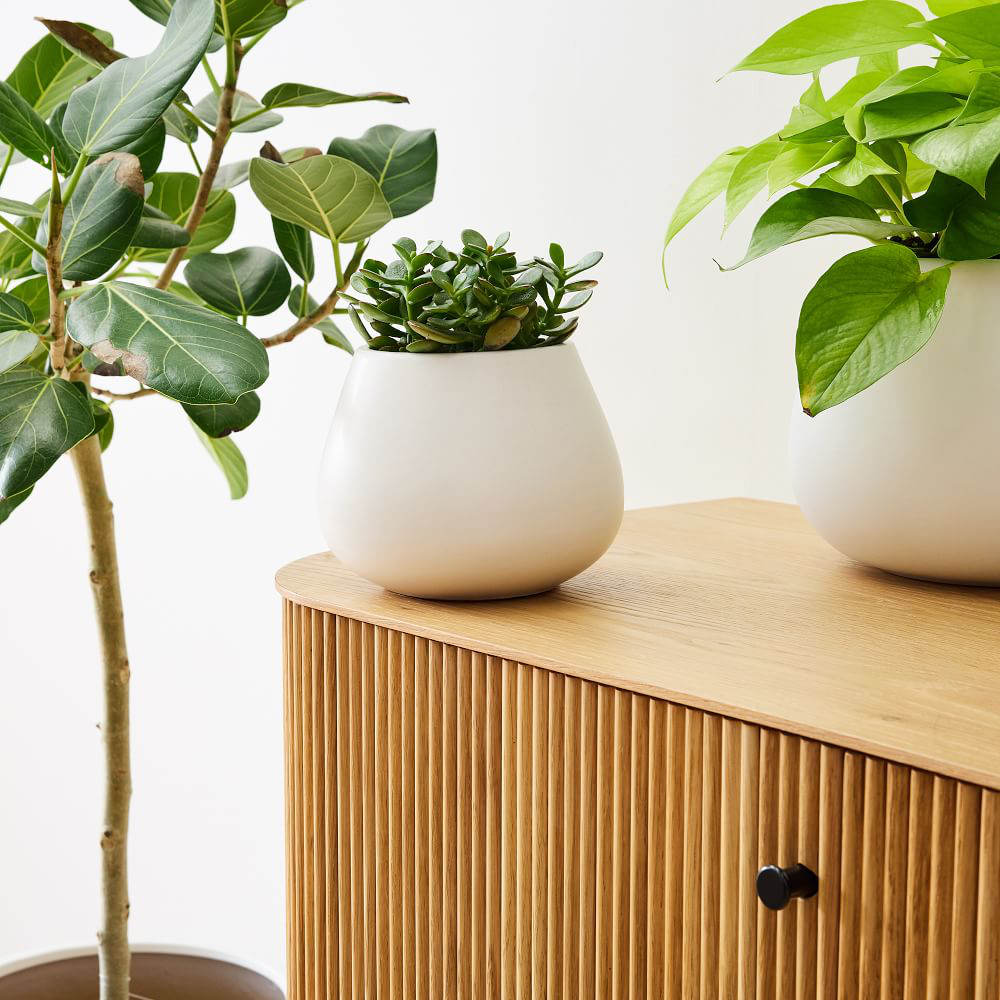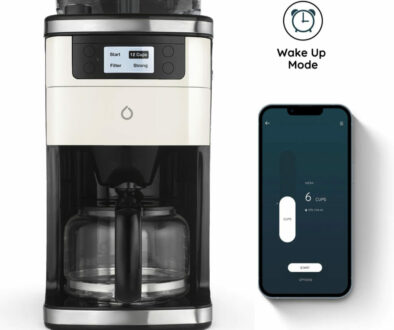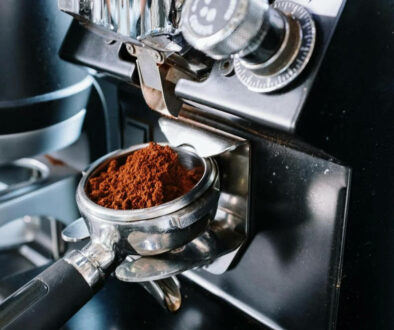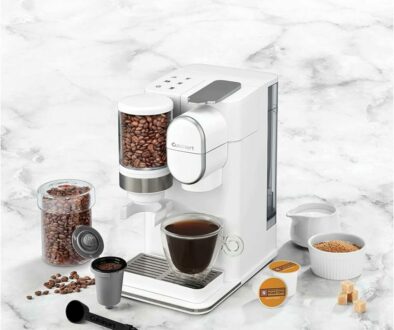How to Store Coffee Beans for Maximum Freshness
Coffee lovers know that nothing beats the aroma and flavour of a freshly brewed cup. But maintaining that freshness requires more than just buying quality beans—it’s all about proper storage.
Coffee beans are highly sensitive to air, moisture, heat, and light, all of which can degrade their quality over time. By learning how to store coffee beans correctly, you can preserve their freshness and enjoy a richer, more flavorful cup every time. Here’s how to keep your coffee beans at their best.
Why Freshness Matters
Coffee beans begin to lose their freshness immediately after roasting. As they age, they release carbon dioxide, and their volatile oils—responsible for much of the coffee’s aroma and flavour—start to dissipate.
Over time, exposure to air and light causes the beans to oxidise, leading to a stale or flat taste. Storing your beans properly will help you extend their shelf life and get the most out of each batch.
Key Factors in Coffee Bean Storage
To maximise the freshness of your coffee beans, you’ll want to protect them from the four main elements that can degrade their quality: air, moisture, heat, and light.
Air: Exposure to oxygen causes coffee beans to go stale due to oxidation. Airtight storage is essential to prevent this process.
Moisture: Coffee beans are hygroscopic, meaning they absorb moisture from the air, which can dilute their flavour and cause mold growth.
Heat: High temperatures accelerate the aging process of coffee beans, causing them to lose their flavour more quickly.
Light: UV rays from direct sunlight can damage coffee beans, leading to a dull and stale taste.
By controlling these factors, you can keep your beans fresher for longer.
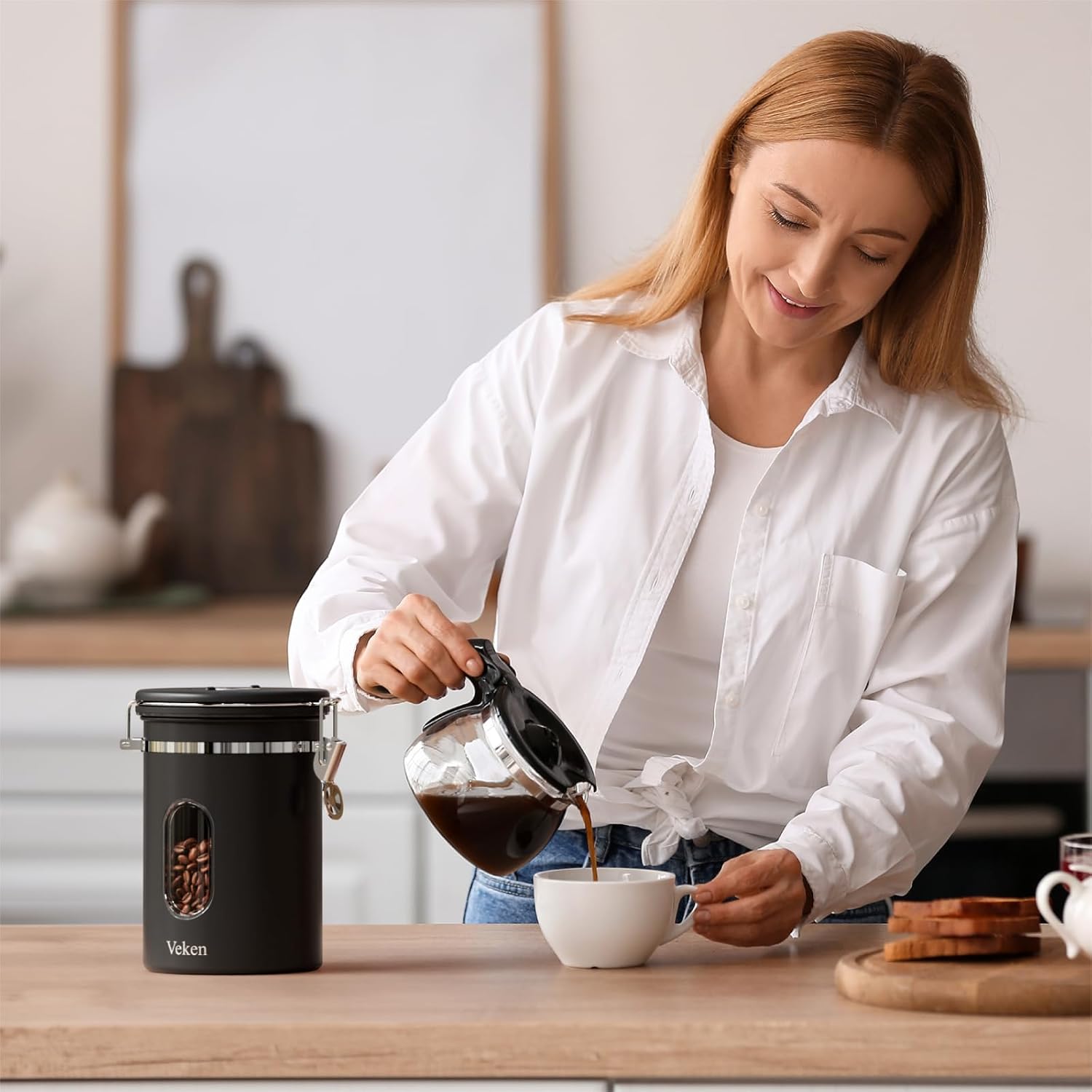
How to Store Coffee Beans for Maximum Freshness
1. Choose an Airtight, Opaque Container
The best storage container for coffee beans is one that is airtight and opaque. Airtight containers prevent oxygen from reaching the beans, while opaque materials block out harmful light. Glass jars with tight-sealing lids, ceramic containers, or stainless steel canisters are excellent options. If you choose a glass jar, ensure it’s stored in a dark place to avoid light exposure. Innovations in coffee bean storage have come a long way giving us more options. Some of these are listed at the bottom of this list.
2. Store in a Cool, Dark Place
Temperature and light are two of the biggest threats to coffee bean freshness. A cool, dark cabinet away from heat sources (like your oven or stovetop) is an ideal storage location. Avoid placing coffee beans in direct sunlight or on a windowsill, as UV rays can damage them.
3. Avoid the Freezer (Usually)
One of the most common questions is whether to store coffee beans in the freezer. While the freezer can slow down the aging process, it’s not always the best choice because coffee beans absorb odors and moisture.
If you’re not planning to use the beans for an extended period, freezing them in a sealed, airtight bag can work. Just make sure to divide them into portions so you can thaw only what you need without repeatedly exposing the beans to temperature fluctuations.
4. Buy Small Batches
For the freshest coffee, buy only as much as you’ll consume within a few weeks. Coffee beans are at their peak flavor within two to four weeks after roasting. By purchasing in small quantities, you can ensure that you’re always using beans that are close to their peak freshness. This practice also reduces the need for long-term storage.
5. Avoid Grinding Beans Until Ready to Brew
Ground coffee loses freshness much faster than whole beans. For the best flavor, grind your coffee beans just before brewing. This minimises exposure to air and helps preserve the delicate oils and flavours that make freshly ground coffee so enjoyable.
If you have to grind your coffee in advance, store the grounds in an airtight container, but understand that they will lose freshness more quickly than whole beans.
Other Tips to Keep in Mind
Reseal Bags Properly: If your coffee beans come in a resealable bag with a one-way valve (often used for releasing carbon dioxide after roasting), it’s fine to store them in their original packaging. Just make sure to reseal it tightly after each use.
Use Desiccants for Extra Freshness: Some coffee storage containers come with desiccant packs to absorb excess moisture. These can be helpful if you live in a humid environment. Avoid adding any moisture-absorbing elements directly to the coffee beans, as this can alter their flavour.
Label the Roast Date: If you buy coffee from a roaster that includes a roast date, take note of it. This date can help you gauge how fresh your coffee is, and serve as a reminder to use up the beans within a reasonable timeframe.
Frequently Asked Questions
Q: How long do coffee beans stay fresh?
Coffee beans generally stay fresh for two to four weeks after roasting. After that, they begin to lose flavor and aroma, though they are still safe to consume.
Q: Can I store coffee beans in the refrigerator?
Storing coffee beans in the refrigerator is not recommended. The refrigerator’s temperature fluctuations and humidity can affect the quality of the beans, and they may absorb odors from other foods.
Q: Can I store ground coffee the same way?
Yes, but keep in mind that ground coffee has a shorter shelf life than whole beans. It’s best to grind coffee beans only when you’re ready to brew, as ground coffee loses freshness more quickly.
Q: Should I store coffee beans in their original packaging or transfer them to another container?
If the original packaging is resealable and includes a one-way valve (often found on bags from specialty coffee roasters), it can be a suitable storage option. However, transferring the beans to an airtight, opaque container will offer even better protection from air and light, especially if you plan to keep them for more than a week.
Q: Can I store coffee beans in a clear container if I keep it in a dark cupboard?
Yes, storing coffee beans in a clear container is fine as long as it’s kept in a dark place, like a cupboard or pantry. Light exposure accelerates degradation.
Q: Is it better to use a vacuum-sealed container for coffee beans?
Vacuum-sealed containers can be beneficial for preserving coffee freshness, as they remove most of the air from the container. This can help slow oxidation and maintain flavor, especially for those who want to store beans for a longer period. However, a standard airtight container will generally suffice for daily use if you’re consuming the beans within a few weeks.
Q: Are plastic clips sufficient to reseal original packaging for coffee beans or grounds?
Plastic clips can work as a temporary solution to reseal the original packaging for coffee beans or grounds, but they aren’t the most effective option for long-term storage. While clips help keep the bag closed, they don’t create an airtight seal, which means air can still seep in and affect the freshness of the coffee. For maximum freshness, it’s better to transfer the beans or grounds to an airtight container that can provide a stronger barrier against air, moisture, and light.
Coffee Bean Storage Canisters
Air tight containers specially designed for coffee bean storage are available. Features include patented vacuum seal system, UV blocking tint to protect the beans from sunlight and rotating date tracker discs on the cover. Others include plunger lid that removes and locks out air and humidity using patented two-way valve and use of premium materials. Take a closer look at the options by clicking on the thumbnails below.
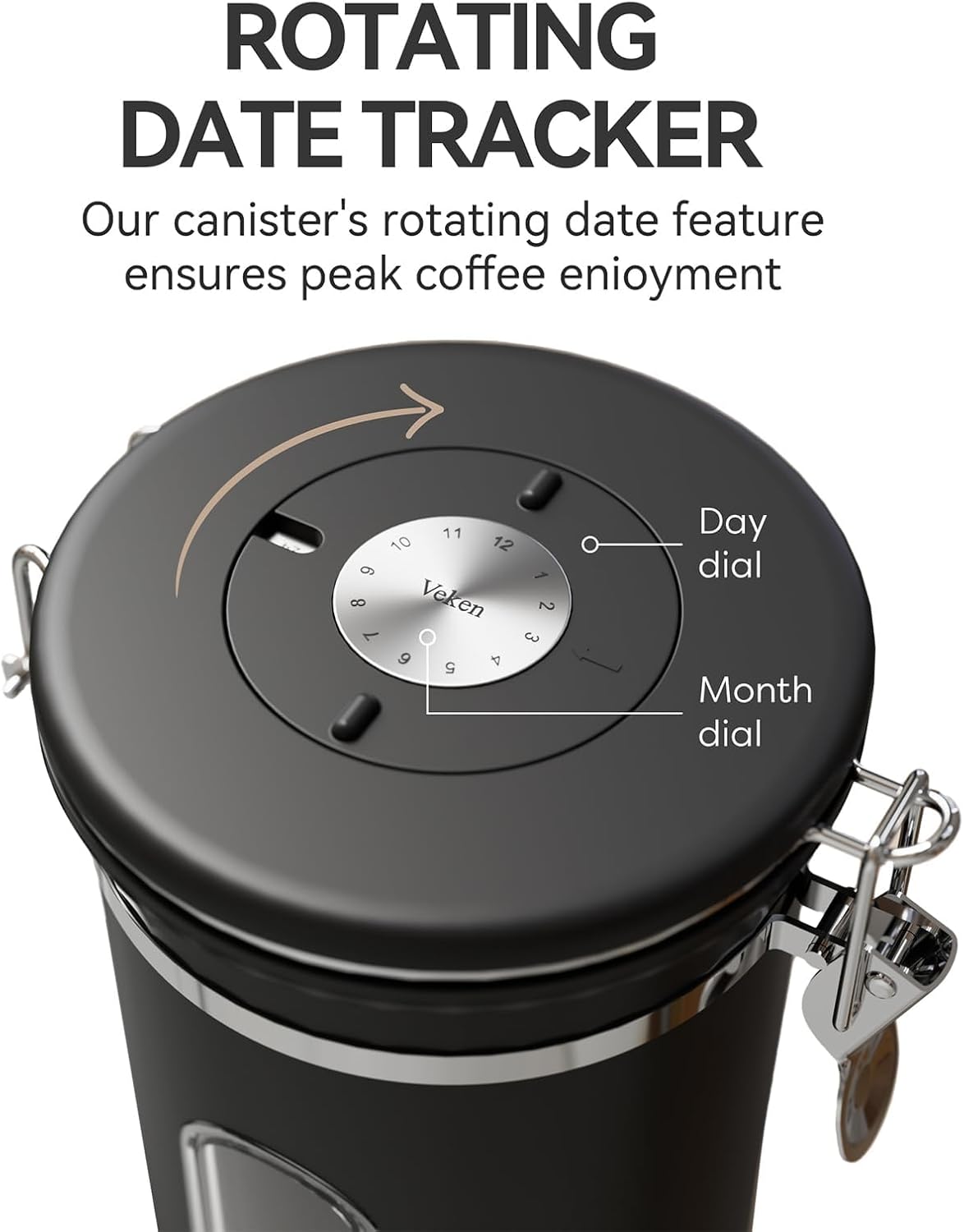
Search Coffee Bean Canister on Amazon
Final Thoughts
Storing coffee beans correctly is the key to maintaining their flavour and aroma. By protecting them from air, moisture, heat, and light, you can extend their freshness and enjoy a more delicious cup every time.
Whether you’re a casual coffee drinker or a dedicated aficionado, these simple storage tips will help you make the most of your coffee beans and elevate your daily coffee ritual.
